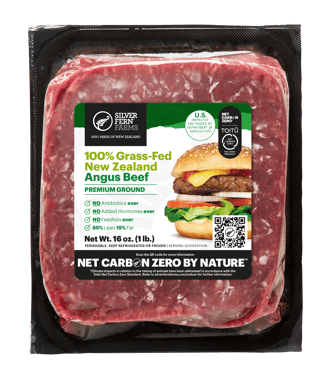Trust and Transparency Redefine Protein Categories
Every protein product has a story to tell.
That authentic story, including how something was sourced, raised, handled, processed or packaged, increasingly matters to consumers. According to a 2022 report from FMI — The Food Industry Association and NielsenIQ, 72% of shoppers say that transparency is either important or extremely important to them when choosing food products. Transparency is defined as having detailed information on what’s in a food and/or how it was made.
Market research also ties transparency to trust. The FMI/NielsenIQ report shows that 64% of consumers would switch from a brand that they typically buy to another brand that shares more detailed information.
[Read more: "What Grocers Should Expect From the Red Meat Sector"]
Consumers who seek to build trust through transparency are looking at several factors. A recent report from Chicago-based marketing, research and creative agency Midan Marketing finds that after price, beef consumers make purchasing decisions based on attributes such as production methods, sustainability, sourcing and quality. Within those attributes, beef shoppers are discerning products by characteristics like preferred breed, the feed that producers use, locally raised animals and the ability to trace back information to the farm. Midan also reports that 68% of people buy beef with production claims at least some of the time.
Likewise, transparency is of growing importance to seafood shoppers. According to FMI’s 2022 “Power of Seafood” report, 50% of seafood consumers say that sustainability claims or certifications have a major impact on their purchase decisions; that said, only 28% report that they’re very knowledgeable about sustainable seafood.
The Clear Advantage
In today’s market, more brands and retailers are engendering loyalty by providing information that shoppers are seeking. “Brand trust and transparency have become substantial points of consideration for beef consumers around the world,” agrees Eric Brandt, president of Brandt Beef, a 100% source-verified and single-source operation in Brawley, Calif. “For us, that means that all our beef comes from our one family-owned operation, where we can track and confirm the origin of all of our animals. Because we personally oversee each step of our process, from cattle feeding to fabrication to steak cutting, we can confidently assure the quality and wholesomeness of everything we put the Brandt Beef brand on. That is the kind of trust we foster with our customers.”
Silver Fern Farms, a New Zealand producer that distributes products in more than 1,600 U.S. stores, has also staked a claim on transparency by, among other things, touting its Net Carbon Zero beef. “Every single kilogram of CO2 emissions associated with our Net Carbon Zero products is counted and removed by the woody vegetation that grows on the group of farms where the animals were raised,” explains David Patragnoni, USA country manager. “Net carbon zero is a clear and understandable proposition, and its linkage to ‘earth-friendly eating’ is very direct. Our methodology is transparent; we publish detailed sustainability reports and engage in a wide range of communication and storytelling initiatives. Our Net Carbon Zero by Nature brand is prominent on the packaging, along with USDA certification of our net carbon zero claims.”
Major protein producers continue to step up their transparency efforts to gain or sustain trust. For example, in its most recent sustainability report, Tyson Foods shares the scope of its FarmCheck audit program, which enables its teams to determine how many farms should be audited each year so that the company can be 99% confident that 95% or more of its supply chain complies with program standards. The Springdale, Ark.-based company maps out its plans and results across many environmental, social and governance (ESG) topics to be more transparent with its global consumers.
Farmer Focus, a 100% USDA organic and Humane Certified chicken company based in Harrisonburg, Va., recently updated its packaging to allow consumers to use a QR code leading to the company website, where visitors can trace a product back to the family farm where it was raised. “USDA organic is at the core of our Farmer Focus brand, but we learned from consumers that they wanted to be reassured of all the attributes that are part of organic certification and what we are doing to go beyond organic,” says Kathryn Tuttle, chief marketing officer.
Egg-cellent Progress
Egg producers are also continuing to share their story as the groundswell of interest in everything from chicken feed to cage space accelerates. Several egg companies have built their respective brands on that notion, such as Austin, Texas-based Vital Farms. The longtime supplier of pasture-raised eggs has recently rolled out restorative eggs, produced using regenerative practices.
In December, Dutch egg farmer Kipster introduced its first carbon-neutral eggs in Michigan and the Cincinnati area at select Kroger Co. stores. Produced using upcycled feed in a cage-free environment, the eggs are sold under the Simple Truth + Kipster name in a carton bearing the Certified Humane logo. “Choosing Simple Truth + Kipster cage-free eggs is an easy way for our customers to help create a more sustainable food system,” notes Denise Osterhues, senior director of sustainability and social impact for Cincinnati-based Kroger. “The Kipster system aligns with Kroger’s Zero Hunger | Zero Waste social and environmental impact plan and mission to advance positive changes for people and our planet. We focus on advancing sustainability and animal welfare in ways that also help maintain access to fresh, affordable foods for everyone.”
Promoting Transparency
Retailers throughout the country continue to publicly share their commitment to transparency, especially in fresh food items like proteins. Boise, Idaho-based Albertsons Cos., for its part, touts efforts to provide shoppers with traceable, quality seafood from “environmentally and socially responsible sources” as part of its Responsible Seafood Program. Cleveland, Ohio-based Heinen’s takes part in the Where Food Comes From CARE Certified program to verify claims for proteins, including beef, pork and poultry; shoppers at Heinen’s can look for the CARE Certified logo on packages of store-brand red meats.
On a broader level, efforts are underway at the government level to advance transparency in the protein sector. One proposed bill is the Cattle Price Discovery and Transparency Act, which would establish minimums for negotiating cattle sales, among other reforms. In August, the U.S. Department of Agriculture extended the comment period for a rule aimed at promoting transparency in poultry production and contracting. Both proposals have received pushback from industry organizations and businesses, which claim, among other things, that the moves would reduce farmer pay and hamper producers’ decision-making freedoms.






